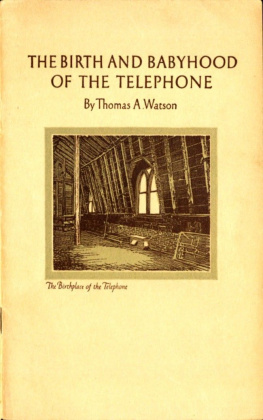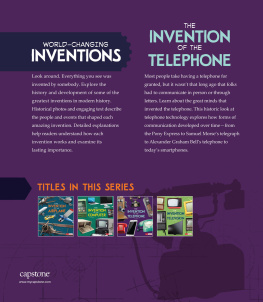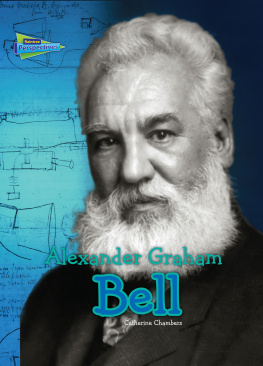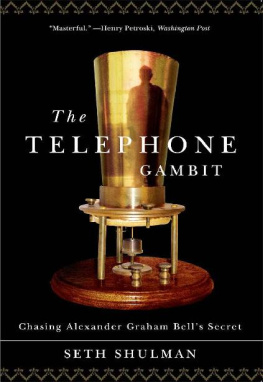Table of Contents
The BIRTH and BABYHOOD OF THE TELEPHONE
by Thomas A. Watson
Assistant to Alexander Graham Bell

Thomas A. Watson
1854-1934
Biography of
THOMAS A. WATSON
Thomas A. Watson was born on January 18, 1854, in Salem, Massachusetts, and died December 13, 1934, at more than four-score years. At the age of 13 he left school and went to work in a store. Always keenly interested in learning more and in making the most of all he learned, every new experience was to him, from his childhood on, an opening door into a larger, more beautiful and more wonderful world. This was the key to the continuous variety that gave interest to his life.
In 1874 he obtained employment in the electrical shop of Charles Williams, Jr., at 109 Court Street, Boston. Here he met Alexander Graham Bell, and the telephone chapter in his life began. This he has told in the little book herewith presented. In 1881, having well earned a rest from the unceasing struggle with the problems of early telephony, and being now a man of means, he resigned his position in the American Bell Telephone Company and spent a year in Europe. On his return he started a little machine shop for his own pleasure, at his place in East Braintree, Massachusetts. From this grew the Fore River Ship and Engine Company, which did its large share of building the U. S. Navy of the Spanish War. In 1904 he retired from active business.
When 40 years of age and widely known as a shipbuilder, he went to college, taking special courses in geology and biology at the Massachusetts Institute of Technology. At the same time he specialized in literature. These studies dominated his later years, leading him in extensive travels all over the world, and at home extending to others the inspiration of a genial simplicity of life and of a love for science, literature and all that is fine in life.
The Birth and Babyhood of the Telephone
By Thomas A. Watson
I am to speak to you of the birth and babyhood of the telephone, and something of the events which preceded that important occasion. These are matters that must seem to you ancient history; in fact, they seem so to me, although the events all happened less than 40 years ago, in the years 1874 to 1880.
The occurrences of which I shall speak, lie in my mind as a splendid drama, in which it was my great privilege to play a part. I shall try to put myself back into that wonderful play, and tell you its story from the same attitude of mind I had thenthe point of view of a mere boy, just out of his apprenticeship as an electro-mechanician, intensely interested in his work, and full of boyish hope and enthusiasm. Therefore, as it must be largely a personal narrative, I shall ask you to excuse my many Is and mys and to be indulgent if I show how proud and glad I am that I was chosen by the fates to be the associate of Alexander Graham Bell, to work side by side with him day and night through all these wonderful happenings that have meant so much to the world.
The Williams Electrical Workshop
I realize now what a lucky boy I was, when at 13 years of age I had to leave school and go to work for my living, although I didnt think so at that time. I am not advising my young friends to leave school at this age, for they may not have the opportunity to enter college as I did at 40. Theres a tide in the affairs of men, you know, and that was the beginning of its flood in my life, for after trying several vocationsclerking, bookkeeping, carpentering, etc.and finding them all unattractive, I at last found just the job that suited me in the electrical work-shop of Charles Williams, at 109 Court Street, Bostonone of the best men I have ever known. Better luck couldnt befall a boy than to be brought so early in life under t he influence of such a high-minded gentleman as Charles Williams.
I want to say a few words about my work there, not only to give you a picture of such a shop in the early 70s, but also because in this shop the telephone had its birth and a good deal of its early development.

Thomas A. Watson in 1874
I was first set to work on a hand lathe turning binding posts for $5 a week. The mechanics of to-day with their automatic screw machines, hardly know what it is to turn little rough castings with a hand tool. How the hot chips used to fly into our eyes! One day I had a fine idea. I bought a pair of 25-cent goggles, thinking the others would hail me as a benefactor of mankind and adopt my plan. But they laughed at me for being such a sissy boy and public opinion forced me back to the old time-honored plan of winking when I saw a chip coming. It was not an efficient plan, for the chip usually got there first. There was a liberal education in it for me in manual dexterity. There was no specializing in these shops at that time. Each workman built everything there was in the shop to build, and an apprentice also had a great variety of jobs, which kept him interested all the time, for his tools were poor and simple and it required lots of thought to get a job done right.
Studies and Experiments
There were few books on electricity published at that time. Williams had copies of most of them in his showcase, which we boys used to read noons, but the book that interested me most was Davis Manual of Magnetism, published in 1847, a copy of which I made mine for 25 cents. If you want to get a good idea of the state of the electrical art at that time, you should read that book. I found it very stimulating and that same old copy in all the dignity of its dilapidation has a place of honor on my book shelves to-day.
My promotion to higher work was rapid. Before two years had passed, I had tried my skill on about all the regular work of the establishmentcall bells, annunciators, galvanometers, telegraph keys, sounders, relays, registers and printing telegraph instruments.
Individual initiative was the rule in Williams shopwe all did about as we pleased. Once I built a small steam engine for myself during working hours, when business was slack. No one objected. That steam engine, by the way, was the embryo of the biggest shipbuilding plant in the United States to-day, which I established some ten years later with telephone profits, and which now employs more than 4,000 men.

Alexander Graham Bell in 1876
Such were the electrical shops of that day. Crude and small as they were, they were the forerunners of the great electrical works of to-day. In them were being trained the men who were among the leaders in the wonderful development of applied electricity which began soon after the time of which I am to speak. Williams, although he never had at that time more than 30 or 40 men working for him, had one of the largest and best fitted shops in the country. I think the Western Electric shop at Chicago was the only larger one. That was also undoubtedly better organized and did better work than Williams. When a piece of machinery built by the Western Electric came into our shop for repairs, we boys always used to admire the superlative excellence of the workmanship.
Experience with Inventors
Besides the regular work at Williams, there was a constant stream of wild-eyed inventors, with big ideas in their heads and little money in their pockets, coming to the shop to have their ideas tried out in brass and iron. Most of them had an ange l whom they had hypnotized into paying the bills. My enthusiasm, and perhaps my sympathetic nature, made me a favorite workman with those men of visions, and in 1873-74 my work had become largely making experimental apparatus for such men. Few of their i deas ever amounted to anything, but I liked to do the work, as it kept me roaming in fresh fields and pastures new all the time. Had it not been, however, for my youthful enthusiasmalways one of my chief assetsI fear this experience would have made me so skeptical and cynical as to the value of electrical inventions that my future prospects might have been injured.















